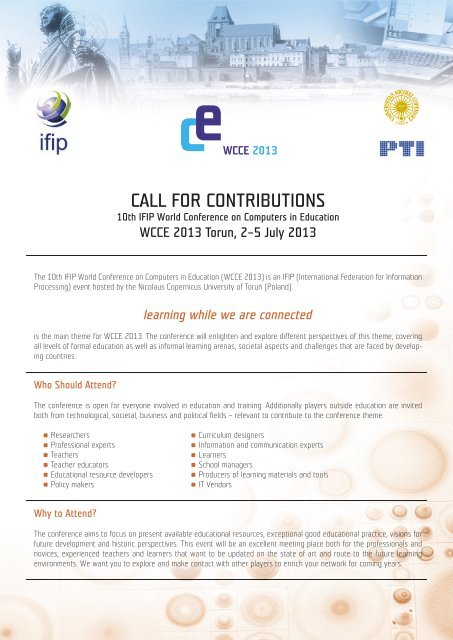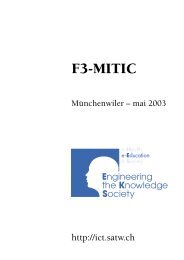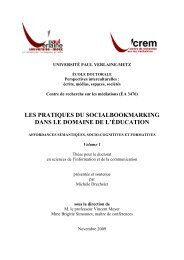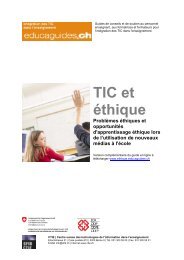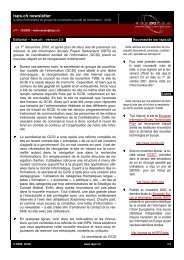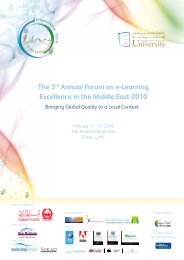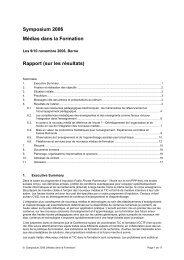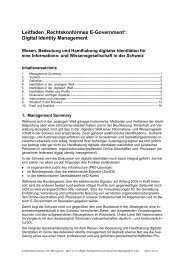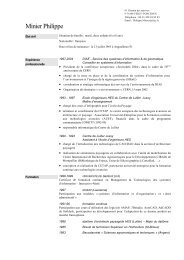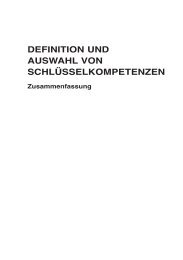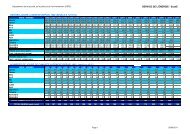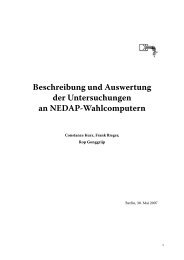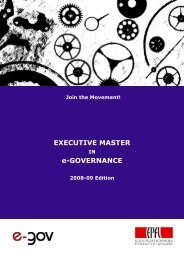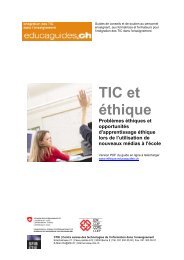WCCE'2013 - Short Information about the ICT 21 process
WCCE'2013 - Short Information about the ICT 21 process
WCCE'2013 - Short Information about the ICT 21 process
Create successful ePaper yourself
Turn your PDF publications into a flip-book with our unique Google optimized e-Paper software.
CALL FOR CONTRIBUTIONS<br />
10th IFIP World Conference on Computers in Education<br />
WCCE 2013 Torun, 2–5 July 2013<br />
The 10th IFIP World Conference on Computers in Education (WCCE 2013) is an IFIP (International Federation for <strong>Information</strong><br />
Processing) event hosted by <strong>the</strong> Nicolaus Copernicus University of Toruń (Poland).<br />
learning while we are connected<br />
is <strong>the</strong> main <strong>the</strong>me for WCCE 2013. The conference will enlighten and explore different perspectives of this <strong>the</strong>me, covering<br />
all levels of formal education as well as informal learning arenas, societal aspects and challenges that are faced by developing<br />
countries.<br />
Who Should Attend?<br />
The conference is open for everyone involved in education and training. Additionally players outside education are invited<br />
both from technological, societal, business and political fields – relevant to contribute to <strong>the</strong> conference <strong>the</strong>me.<br />
Researchers<br />
Professional experts<br />
Teachers<br />
Teacher educators<br />
Educational resource developers<br />
Policy makers<br />
Curriculum designers<br />
<strong>Information</strong> and communication experts<br />
Learners<br />
School managers<br />
Producers of learning materials and tools<br />
IT Vendors<br />
Why to Attend?<br />
The conference aims to focus on present available educational resources, exceptional good educational practice, visions for<br />
future development and historic perspectives. This event will be an excellent meeting place both for <strong>the</strong> professionals and<br />
novices, experienced teachers and learners that want to be updated on <strong>the</strong> state of art and route to <strong>the</strong> future learning<br />
environments. We want you to explore and make contact with o<strong>the</strong>r players to enrich your network for coming years.
Presentation Types<br />
The following types of presentation are invited:<br />
Papers: full and short papers, posters<br />
Panels<br />
Thematic streams<br />
Professional groups meetings<br />
Tutorials<br />
Workshops – before, during or after <strong>the</strong> conference<br />
Software and / or tools demonstrations<br />
Exhibitions (companies)<br />
Full papers will be blind peer reviewed by <strong>the</strong> International Program Committee. All o<strong>the</strong>r contributions will be reviewed for<br />
suitability, content and relevance.<br />
Topics<br />
Proposals are invited on a wide range of topics relevant to <strong>the</strong> conference <strong>the</strong>me and may include, but not restricted to, <strong>the</strong><br />
following areas:<br />
1. Changing pedagogy: formative assessment, teacher role, student role, e-assessment, shared pedagogy, e-pedagogy<br />
2. Emerging tools for education: wiki, blog, social networking, micro-blog , Web 2.0, Web 3.0, mobile technologies<br />
3. Digital pedagogy: collaborative, adaptive, personalised, AI, learner centred, e-participation<br />
4. Developing computational thinking: learning programming, programming environments, visualisation of algorithms,<br />
modelling, simulation, informatics / computing curricula, understanding computing, taxonomy of computing<br />
5. Attracting students to learn sciences: interactive learning, collaborative investigations, team work, virtual laboratories,<br />
online experiments<br />
6. Re-engineering teacher education: new teacher roles, professional development, pre-service education, peer learning,<br />
practices research<br />
7. Collaborative learning communities: online, social networking<br />
8. Researching <strong>ICT</strong> in education: new research approaches , new methods, innovative strategies, new models, complex<br />
systems , inquiry learning<br />
9. Learning through games and simulation: online gaming, contests, competitions, serious games, science simulations<br />
10. e-Inclusion and e-Participation: special educational needs, gender issues<br />
11. Virtual schooling: learning objects, distance learning, curriculum integration, mentor-ing, evaluation issues, teacher<br />
collaboration, PLE, lifelong learning,<br />
12. Re-structuring education systems, management of Complexity: policy, e-safety, restructuring, classrooms, learning<br />
spaces, change <strong>the</strong>ories<br />
Deadline and Dates<br />
December 17, 2012 / Submission of papers and o<strong>the</strong>r contributions<br />
February 15, 2013 / Notification of acceptance<br />
February 28, 2013 / Final programme<br />
March 18, 2013 / Speakers final confirmation<br />
April 1, 2013 / Early Bird<br />
July, 2–5, 2013 / Conference dates<br />
Publications<br />
All presentations will appear in a book of abstracts<br />
Conference proceedings will be published in a volume by Springer Verlag<br />
Post conference book<br />
Special issues of journals<br />
IFIP digital library<br />
See details (submissions, registration, accommodation, travel to Torun, tours, etc.): http://wcce2013.umk.pl/<br />
wcce2013@umk.pl UMK Toruń, July 2–5, 2013 http://wcce2013.umk.pl


